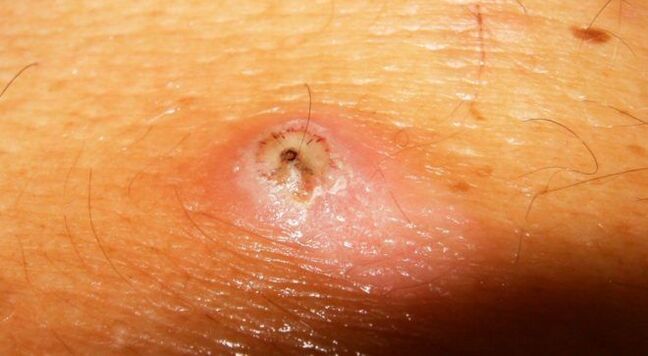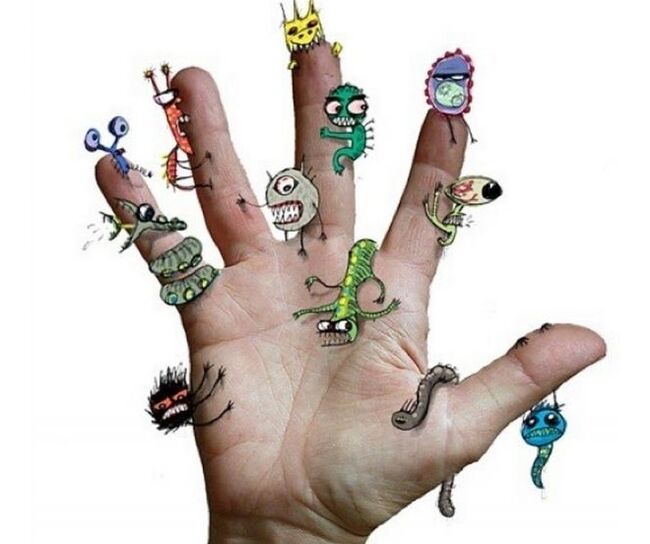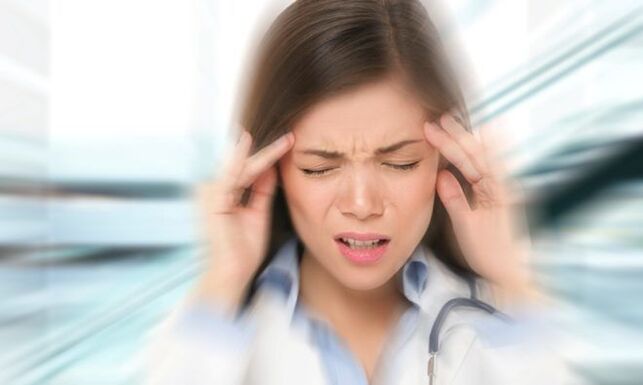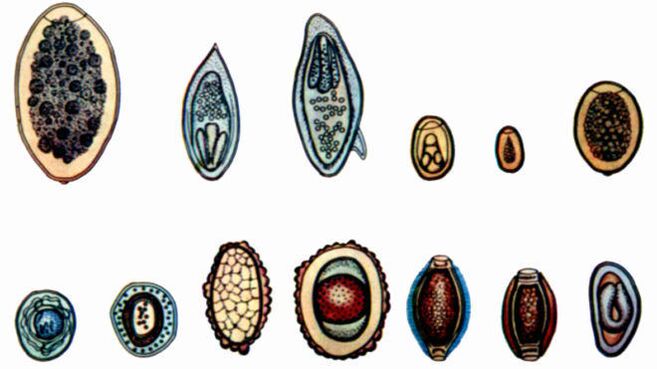Human infections caused by the presence of parasites are more common than the naked eye. They can cause serious health complications in adults and children. There are several types of infection, depending on their size and whether the parasite is present in the human blood or on the surface of the human body.
Typical symptoms of human parasite infection
The human body may contain microparasites (malaria), which can only be seen under a microscope.
The other is the large parasites-round and flat worms (nematodes, tapeworms, etc. ), which can usually reach a huge body in the body of an infected person.
The presence of internal parasites is not limited to the intestines, they often affect the lungs, liver, muscles, brain, blood, skin and even eyes.

The symptoms of the presence of parasites in the human body depend on the type of the parasite itself and its toxic waste:
- Chronic diarrhea caused by food malabsorption;
- Chronic constipation, flatulence and bloating (especially after eating) or any other digestive problems, including heartburn, abdominal pain and cramps, mucus or blood in stool, intestinal problems, etc. ;
- Puffy eyes and dark circles;
- fever;
- pancreatitis;
- Nausea, lack of energy, lethargy and depression;
- Chills and weakness.
Parasites and skin
Symptoms of skin parasitic infections mainly include itching. Inflammation of the tissue increases the number of white blood cells that protect the body.
This reaction often causes skin irritation. The person may even develop food allergies.

Parasites release toxins, and the skin is the largest organ, trying to get rid of them. As a result, various skin problems occur.
Signs of parasitic infection include:
- Dry skin and hair;
- Hair loss;
- Allergies and allergic reactions to food;
- Itchy nose, skin or anus;
- Eczema, stomatitis;
- swelling;
- There is a feeling of "crawling under the skin";
- jaundice.
Parasites and the nervous system
Toxins secreted by human parasites can affect the central nervous system. Uncertainty and tension are usually caused by the presence of harmful organisms in our bodies.
Signs of parasites related to the central nervous system in the human body:
- Rapid and frequent mood swings;
- Anger and irritability;
- tension
- Frustrated;
- Forgetfulness and confusion;
- anxiety;
- Anxiety;
- Slow down the reaction speed;
- Violation of attention.
Parasitic infections can poison the body. Even at rest, the body will respond to them, because at night, the manifestation of parasitic infection is the most expressive.
Infected people usually wake up at night, especially between 2: 00 and 3: 00, when the liver is trying to expel toxins from the body.

This leads to the following signs of parasites in the human body:
- Insomnia and sleep disorders;
- Grind your teeth while sleeping;
- Increased night sweats and salivation.
It is usually not long for signs of parasites to be diagnosed in the body. The "small worm" can survive in its host for a long time without being detected, consuming the main nutrients he gets from food.
Parasites in the body often cause a person to eat a lot. However, the infected person cannot gain weight.
Other symptoms of body infection
Parasites can move in almost all soft tissues (including joints and muscles) and form cysts and inflammations in them. The symptoms of these parasites in the human body are often incorrectly referred to as arthritis or muscle pain.
Parasitic toxins also often accumulate in joints and muscles, resulting in muscle cramps and pain, joint aches, abdomen, chest, rheumatic pain and increased heart rhythm. What signs appear depends on the affected system or organ.
Parasites also often cause problems related to the urinary and excretory systems. After inhalation, the larvae "wander" in the respiratory system, causing the following symptoms:
- Acute bronchitis;
- asthma;
- pneumonia;
- cough;
- Feeling of a foreign body in the throat;
- hard to swallow;
- Bad breath and so on.

Symptoms of parasites in the human body can be very atypical, and certain types of worms are difficult to identify. This is especially due to complex diagnosis: usually 3 to 6 stool samples are required to eliminate false results. However, in fact, for the patient's rejection, only a negative conclusion is sufficient.
Of course, parasites do not hide behind all diseases, but they often participate in the occurrence of some of these diseases. For example, roundworms appear in the stomach and gastrointestinal tract through bloating and flatulence. Many of these can cause bowel obstruction and constipation. Scar eggs can be swallowed with unwashed vegetables.
The worms in the body usually cause nausea and diarrhea. They can easily pass through the intestinal wall into the vascular system and may cause:
- Hemorrhoids;
- Women discharged from hospital;
- Bladder inflammation;
- The bile duct is blocked.
Parasitic infections are often the source of health problems such as tissue damage (thus, vulnerable areas are more vulnerable to viruses and bacteria).
Dizziness and parasites
In the presence of parasites in the human body, symptoms and treatment are closely related. For example, this applies to vertigo (dizziness). Our ancestors have noticed the connection between vampires and dizziness. All flukes (there are several types) reduce metabolism, block bile ducts, worsen liver function and increase cholesterol levels.
Even the largest human parasite, the widespread tapeworm, is relatively common. Infections mostly occur in fishing areas. The source is freshwater fish-salted or smoked.

Although dog and cat worms are not common in humans, they are no exception.
What can parasites in the body cause?
They can provoke the development of many serious diseases; however, their role in causing such diseases is often overlooked.
- Parkinson’s disease can be caused by several major parasites: Trichomonada vaginalis (Trichomonada vaginosis), blood has penetrated into the brain, Pallidum, usually congenital, Nocardia (Nocardia asteroid)), Echinococcus tapeworm and other parasites.
- Parasite larvae migrate to the larynx and pharynx, easily accumulate on the thyroid, and cause autoimmune processes (this is a characteristic of multiple sclerosis). Multiple sclerosis is caused by dysentery amoeba (tissue amoeba), echinococcus (echinococcus multicoccus E), Borrelia, and sometimes gonorrhoeae or meningococcus.
- Ankylosing spondylitis is similar to this, which is usually caused by Echinococcus and tapeworms invading the spinal canal and compressing peripheral nerves.
- Epilepsy and dizziness. The reason may be a large number of parasites in the cerebellum or inner ear (tendon, tapeworm, echinococcus tapeworm). There is often a bacterial load.

The cysts of some parasites have a multi-layer protective shell, which makes them almost indestructible. Live larvae can survive for up to 30 years (Trichinella spiralis). Various clumps under the skin can form worms, Trichinella, and Echinococcus tapeworms.
How to remove parasites from the body?
First of all, to remove parasites from the human body, it is important to clean the entire digestive system. A clean, muscular intestine is not a good place for intestinal parasites.
Step 1. Regarding intestinal cleansing, herbs play an important role. The most effective method is as follows:
- Chamomile
- Tansy
- grass
- Oak bark
- Helichrysum
- sage
- Sea buckthorn bark.
Eating onions and garlic is a good way. Pumpkin seeds can also treat parasitic infections.

If you cannot overcome the problem alone, you need to contact the specialist who prescribes anthelmintics.
important! During treatment, all family members and animals living in the same house must complete the treatment process to avoid re-infection.
Step 2. Increasing fiber intake will speed up the movement of undigested food residues to avoid the time needed to settle-this reduces the quality of the soil where the parasites are colonized.
Step 3. Prevent vitamin deficiency. Adequate intake of vitamins, minerals and nutrients is essential to fight against parasitic infections.
Step 4. Determine the source of infection and prevent infection:
- It is important to avoid contact with known sources of infection, such as rodent feces, cat feces, contact with dogs is inappropriate;
- You need to be careful if you are not familiar with the quality of drinking water and/or swimming in the water;
- To prevent biting blood-sucking insects that may carry parasites, you need to wear protective clothing;
- Before eating, all fruits and vegetables should be washed with water-this will also help avoid infection;
- Water from potential sources of pollution should not be used for watering vegetables.
Children are particularly susceptible to parasites; worms are often present in children’s organisms. Therefore, they must be taught good hygiene habits-washing hands after going to the toilet, playing outdoors and before eating.
Precaution
Infection can occur through underwear, sheets, towels, household items such as toys, tableware, glasses, and of course animals (parasites lay invisible eggs on their fur) in the same laundry basket.
It is important to wash the bed and underwear frequently in water at a temperature of at least 60°C and on all clothes that come in contact with the private parts of the body. During the deworming period, these items should be washed every day, and washed separately from other clothing.
It is also recommended to sleep in underwear to avoid involuntarily scraping the anus on the night when the parasite is most active and laying eggs.
Do not let pets sit on your bed, sofa, pillow or blanket.
Since many parasitic eggs are resistant to the pH of detergents and soaps, it is necessary to clean sinks and toilets frequently with alcohol.

























